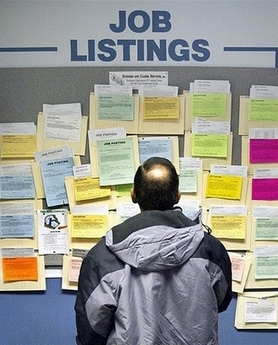US employers chop 80,000 jobs in March
Updated: 2008-04-04 21:25
WASHINGTON - US employers worried about recession slashed 80,000 jobs in March, the most in five years and the third straight month of losses.
|
A man looks at job listings. A stumbling US economy lost 63,000 jobs in February, according to a shockingly weak report released Friday as the top White House economic adviser warned the economy could shrink. [Agencies] |
At the same time, the national unemployment rate rose from 4.8 percent to 5.1 percent, the clearest signal yet that the economy might already be contracting. The new snapshot of the job market, released by the Labor Department Friday, underscored the damage that a trio of crises _ in the housing, credit and financial sectors _ has inflicted on companies, jobseekers and the economy as a whole.
The unemployment rate was the highest since September 2005, when significant job losses followed the devastating blows of Gulf Coast hurricanes.
The new employment figures were much weaker than economists were expecting. They were anticipating a drop of 50,000 payroll jobs and the unemployment rate to rise to 5 percent.
The 5.1 percent rate is relatively modest by historical standards, but was nonetheless the highest in more 2 1/2 years.
Job cuts in both January and February turned out to be even deeper. Employers got rid of 76,000 in each month. The elimination of 80,000 jobs in March was the most since March 2003, when the labor market was still struggling to recover from the 2001 recession.
The economy is suffering the effects of a housing collapse, a credit crunch and a financial system in turmoil. That's causing people and businesses to hunker down, crimping spending, capital investment and hiring. Those things in turn further weaken the economy in what has become a vicious cycle.
For the first time, Federal Reserve Chairman Ben Bernanke acknowledged Wednesday that the country could be heading toward a recession, saying federal policymakers are "fighting against the wind" in combating it. Many other economists and the public believe the recession already has arrived.
Economists define a recession as two consecutive quarters of negative growth.
Bernanke wouldn't tip his hand about the Fed's next move. However, many economists believe the central bank will lower interest rates again when they meet later this month.
The Fed has taken a number of extraordinary actions recently _ slashing interest rates, providing financial backing to JP Morgan's takeover of troubled Bear Stearns and opening an emergency lending program for big investment houses. All the actions are ultimately aimed at limiting damage to the national economy.
With a public on edge, Congress, the White House and presidential contenders are scrambling to come up with their own relief plans even as they engage in a political blame game.
With the pace of hiring slowing down, the number of unemployed people increased to 7.8 million in March; workers with jobs saw only modest wage gains at the same time.
Average hourly earnings for jobholders rose to $17.86 (euro11.36) in March, a 0.3 percent increase from the previous month. That matched economists' forecasts. Over the past 12 months, wages grew 3.6 percent. With lofty energy and food prices, workers may feel like their paychecks are shrinking.
Many analysts believe the economy shrank in the first three months of this year and could still be ebbing now. The government will release its estimate of first-quarter economic growth later this month.
Bernanke, however, has said he is hopeful the economy will improve in the second half of this year, helped by the government's $168 billion (euro106.86 billion) stimulus package of tax rebates for people and tax breaks for businesses, as well as the Fed's rate reductions.
Still, even Bernanke predicted this week that the unemployment rate would rise in the months ahead. Some analysts say it could climb to 5.5 percent or higher by year's end.
|
||
|
||
|
|
|
|








